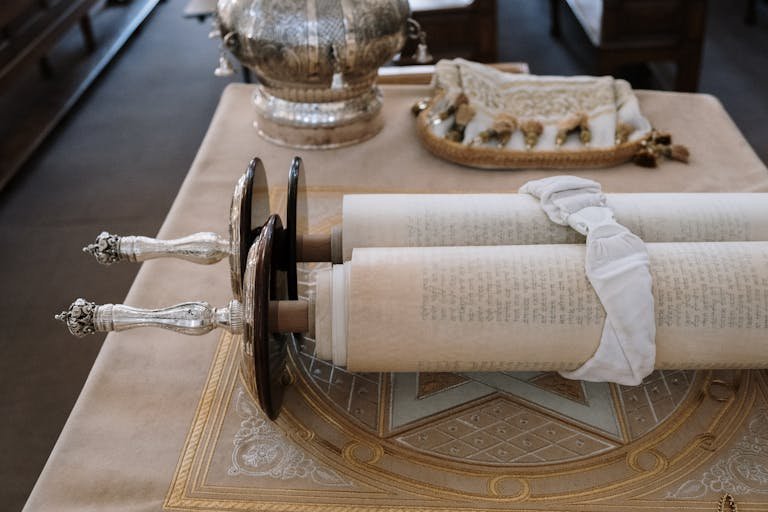Why did God have to become human? Couldn’t He, being all-powerful, just snap His fingers and save us all? Why the incarnation? Why the cross? Why the mess of humanity?
The answer lies buried in the rich soil of ancient Israelite law. It’s found in a concept most of us have never studied but one that has shaped the very core of Christianity. It’s a concept called the Kinsman Redeemer.
What Is a Kinsman Redeemer?
Let’s break this down. In ancient Hebrew culture, when a person fell into poverty and lost everything; land, legacy, even freedom ..there was a built-in rescue plan. This wasn’t government aid. It wasn’t charity. It was family.
The law provided for a go’el (Hebrew for “redeemer”), a close relative who could step in to:
- Redeem property that had been sold (Leviticus 25:25)
- Redeem a relative who had sold himself into slavery (Leviticus 25:47-49)
- Marry a childless widow to continue the family name (Deuteronomy 25:5-10)
- Avenge the wrongful death of a relative (Numbers 35:19)
But not just anyone could do this. The redeemer had to be three things:
- A close relative
- Willing to redeem
- Able to pay the price
These were not ceremonial gestures. They were costly acts of love and loyalty. This was justice soaked in mercy.
The Human Dilemma: Why We Needed a Redeemer
Now zoom out. Humanity is not just poor in a financial sense. We’re spiritually bankrupt. Our inheritance, once rich in fellowship with God, is lost. Our freedom? Forfeit. We’re not just victims, we’re complicit. The Bible is clear: “For all have sinned and fall short of the glory of God” (Romans 3:23, NKJV).
We need help. But not just any help. We need a kinsman redeemer.
And here’s the twist: No ordinary human could qualify. We needed someone like us, a fellow human, but unlike us, someone without sin. We needed someone close enough to redeem and yet pure enough to make the payment.
Why God Became Flesh: The Perfect Fit
Enter Jesus.
God didn’t send a prophet or a delegate. He came Himself. “And the Word became flesh and dwelt among us…” (John 1:14, NKJV). Jesus, born of a woman, entered the world through blood and pain, just like you and me. He became our brother, our kinsman.
He lived a sinless life. He walked the dusty roads of Galilee, wept at funerals, ate with outcasts, and suffered unjustly. He didn’t just act like one of us, He was one of us.
He had the right. He had the resources. He had the resolve.
Jesus is the only one who could fulfill all three qualifications of the kinsman redeemer:
- Related: He took on flesh and blood (Hebrews 2:14).
- Willing: He said, “I lay down my life that I may take it again. No one takes it from Me, but I lay it down of Myself” (John 10:17-18, NKJV).
- Able: He paid the price with His own blood: “Knowing that you were not redeemed with corruptible things… but with the precious blood of Christ” (1 Peter 1:18-19, NKJV).
The Love Story in Ruth: A Foreshadowing
To make this more vivid, let’s look at the book of Ruth. It’s not just a love story; it’s a theological earthquake.
Ruth, a Moabite widow, had nothing. No husband. No inheritance. No future. Enter Boaz, a relative of her deceased husband. He steps in. He redeems her. He marries her. He restores her legacy.
Boaz wasn’t obligated. He wasn’t coerced. He chose to redeem Ruth.
Boaz is a type of Christ. Ruth is us. Broken, empty, and powerless to change our situation until grace steps in.
The Cross: Where Redemption Was Finalized
The ultimate act of redemption wasn’t a legal transaction in a court or a negotiation behind closed doors. It happened publicly, brutally, on a Roman cross.
There, Jesus didn’t just offer a bailout, He offered Himself. The cross wasn’t a backup plan. It was the plan.
Paul writes, “Christ has redeemed us from the curse of the law, having become a curse for us” (Galatians 3:13, NKJV).
He paid what we owed. He did what we couldn’t. He redeemed what was lost.
What Does This Mean for You?
If you’ve ever felt unworthy, disconnected, or too far gone, this is your story. Redemption isn’t for the polished or the perfect. It’s for the desperate, the willing, the honest.
Jesus didn’t become human because He had to. He did it because love demanded it.
He didn’t just redeem you. He made you family.
So, the next time you hear the word “redeemer,” don’t think of an old religious term. Think of a brother who stepped in, a Savior who bled, and a God who refused to leave you in ruin.
That’s the power of the kinsman redeemer.
Final Thoughts for Your Journey
We live in a world full of self-help slogans and temporary fixes. But redemption, real, soul-deep redemption, only happens when Jesus is at the center.
He’s not just a good teacher. He’s not just a historical figure. He is your kinsman redeemer.
And that changes everything.





